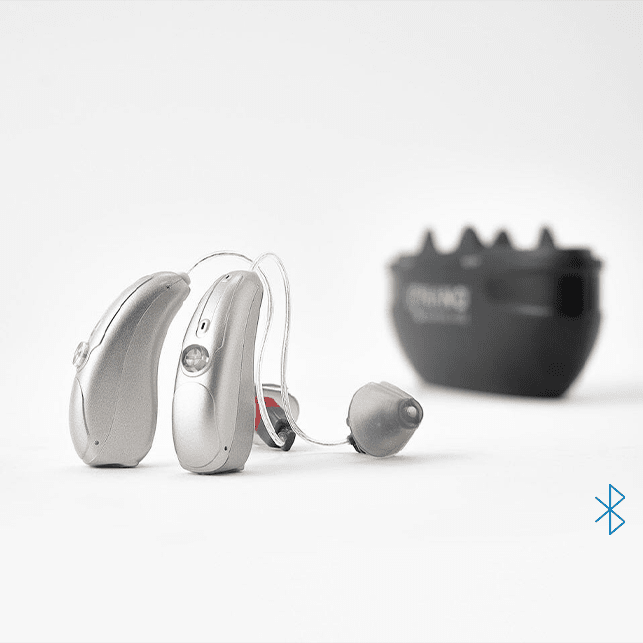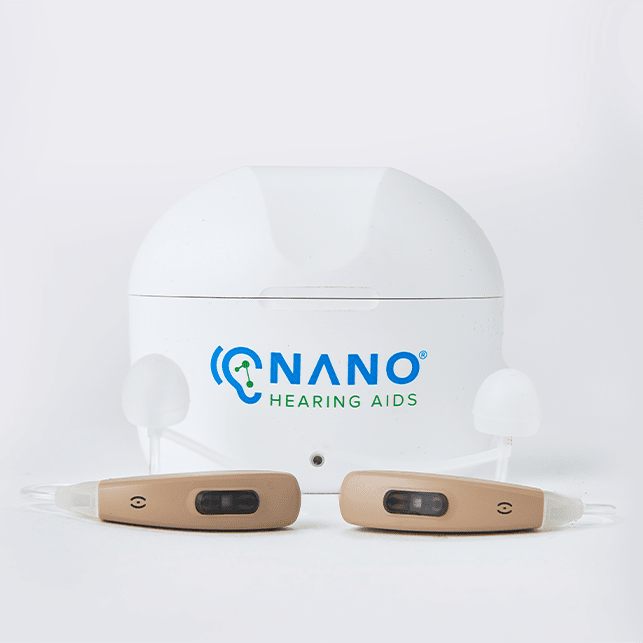Living with stress and anxiety can be overwhelming, particularly when these feelings are linked to tinnitus. Tinnitus, often characterized by a persistent ringing or buzzing in the ears, can be both a symptom and a cause of stress and anxiety. For individuals experiencing tinnitus as a result of mild to moderate hearing loss, OTC hearing aids could potentially offer relief and improve quality of life.
What is Tinnitus?
Tinnitus is a condition where individuals hear sounds, such as ringing, buzzing, or humming, without an external source. These sounds can vary in intensity and can be continuous or intermittent. Tinnitus is often associated with hearing loss, particularly age-related hearing loss, and noise-induced hearing loss.

Potential Causes of Tinnitus
Tinnitus can be caused by a variety of factors, including stress and anxiety, exposure to loud noises, age-related hearing loss, earwax buildup, ear infections or injuries, and certain medications. Understanding the underlying cause of tinnitus is crucial for effective management. A hearing healthcare professional can help determine the cause and recommend appropriate treatment options.
How Can Stress and Anxiety Cause Tinnitus?
When the body experiences stress and anxiety, it goes into a heightened state of alertness known as the "fight or flight" response. This physiological reaction can lead to various physical symptoms, including increased heart rate, high blood pressure, and muscle tension. These physical changes can impact the auditory system, potentially leading to the development or worsening of tinnitus.
Stress and anxiety can also cause changes in blood flow and pressure within the ear, which might result in the perception of ringing or buzzing sounds. Additionally, stress-related behaviors such as teeth grinding or jaw clenching can create tension in the muscles around the ear, contributing to tinnitus symptoms.
Mental health conditions, including various anxiety disorders (such as generalized anxiety disorder), social anxiety disorder, panic disorder, and separation anxiety disorder, can exacerbate these physical symptoms, creating a cycle where anxiety triggers tinnitus and the presence of tinnitus further increases anxiety.
Additionally, individuals under chronic stress might become more aware of internal bodily noises, including tinnitus. The brain, in an attempt to protect itself, might hyperfocus on these internal sounds, amplifying their perceived intensity. This increased focus can lead to a heightened awareness of tinnitus, making it more intrusive and distressing.
Can Stress and Anxiety Be Symptoms of Tinnitus?
Yes, stress and anxiety are common symptoms experienced by individuals with tinnitus. The constant noise in the ears can trigger anxiety and exacerbate stress, leading to a cycle that can be difficult to break. This connection is significant, as it highlights the importance of addressing both tinnitus and anxiety to improve overall mental health.
Mild to Moderate Hearing Loss
If you experience perceived mild to moderate hearing loss, you could benefit from OTC hearing aids. Perceived mild to moderate hearing loss can manifest in several ways. Common symptoms include difficulty hearing conversations in noisy environments or when there is a lot of background noise. You might feel tired from listening, find it challenging to follow conversations in group settings, and have trouble hearing someone on the phone. Additionally, you might need to increase the volume on the TV or radio, even if others find the volume level too loud.
However, if you experience tinnitus, you should consider meeting with a hearing healthcare professional who can determine the cause of your condition and the best course of treatment.
Symptoms of Severe Hearing Loss
Severe hearing loss has more pronounced symptoms. You might have difficulty hearing conversations even in quiet settings. You might be unable to hear sounds or find it very difficult to hear sounds, including loud noises. As a result of your hearing loss, you might rely on reading lips to understand speech.
If you experience these symptoms, you should consider scheduling a consultation with a hearing healthcare professional for a comprehensive evaluation and to explore advanced treatment options.
Ways to Manage Stress and Anxiety Related to Tinnitus
If you're experiencing stress and anxiety along with tinnitus, there are several strategies that can potentially help:

Additional Symptoms of Tinnitus
Experiencing stress and anxiety are just two symptoms associated with tinnitus. Additional symptoms can include ringing in the ears (or just one ear), buzzing or hissing sounds in one or both ears, hearing loss, dizziness, difficulty sleeping, trouble concentrating, and ear discomfort.
Tinnitus can significantly impact daily life, contributing to stress and anxiety.
Understanding the connection between these conditions and exploring treatment options could improve your overall well-being. If you experience tinnitus along with stress and anxiety symptoms, consider consulting with a hearing healthcare professional to determine the best course of action.
OTC Hearing Aids For Perceived Mild To Moderate Hearing Loss
Many people with perceived mild to moderate hearing loss have found it beneficial to wear hearing aids that are OTC, as they can be a great solution for improving hearing. These FDA-regulated devices don't need a prescription, hearing exam, or doctor's appointment. You can try them in the comfort of your home, and you can adjust the volume to suit your specific needs. With Nano OTC hearing aids, you simply pick the best dome size for your ears, turn them on, and put them in. Keep in mind it might take several days or weeks for your ears and brain to get used to them, which is why Nano OTC Hearing Aids comes with a 45-day money-back guarantee and free 24/7 lifetime support.




